Search
Viewing 1 to 15 of 71 news
-

Week van de Fair Trade 2024: van 2 tot 12 oktober
Evi COREMANS | 13/09/2024
Op 2 oktober 2024 geeft TDC de aftrap voor een nieuwe Week van de Fair Trade. Deze nationale bewustmakingscampagne plaats fair trade 10 dagen lang in de spotlights in heel België, met heel wat persaandacht en een uitgebreid aanbod aan lokale activiteiten.Meer nieuws op de campagnewebsite www.weekvandefairtrade.be.
-
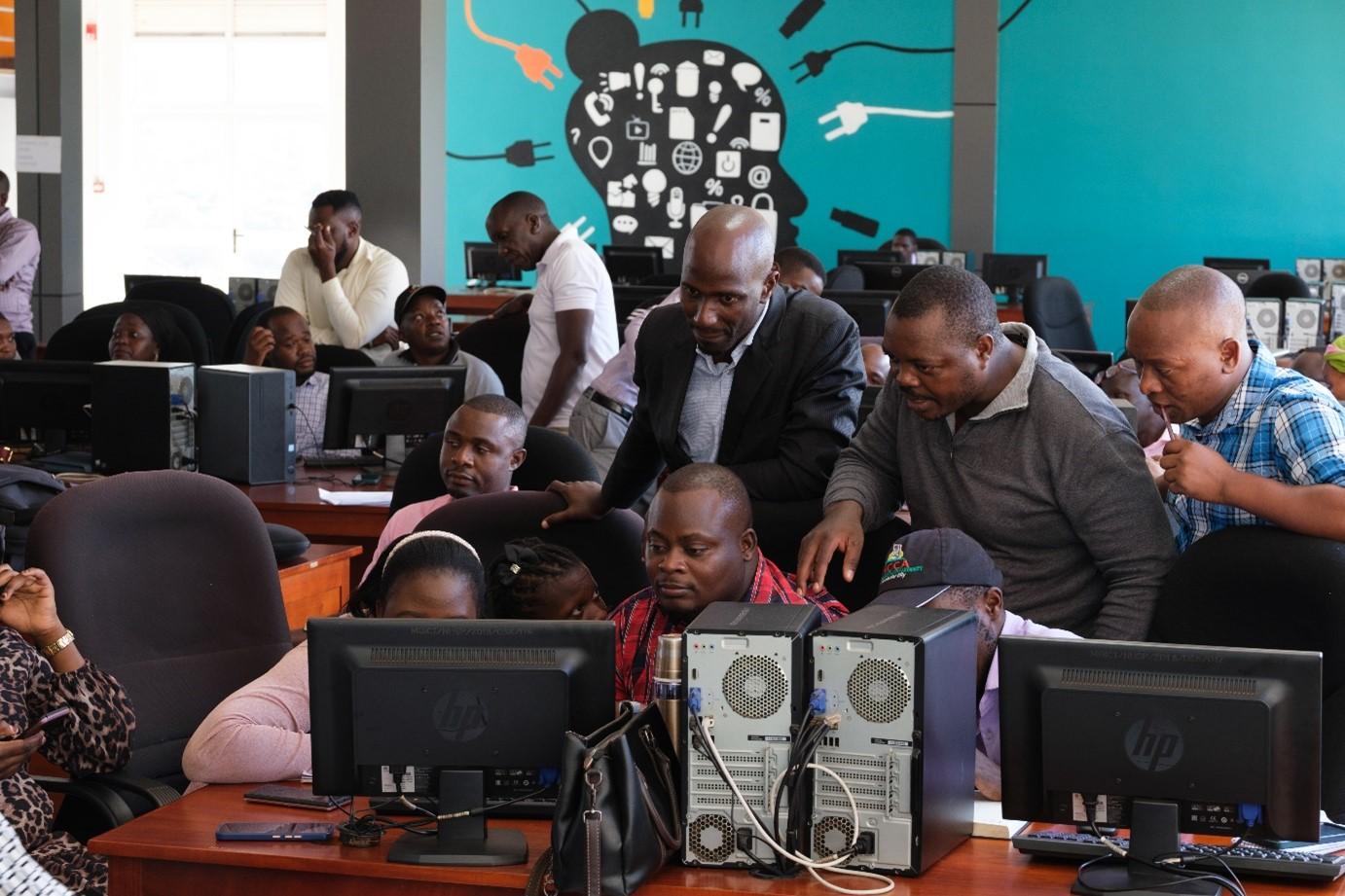
With the support of Team Europe, Uganda moves forward on its digital transformation journey
Nils JANSSENS | 24/08/2023
When the COVID-19 pandemic broke out in 2020, much of the world moved online, accelerating a digital transformation that was underway for decades. Uganda was no exception to this trend. Faced with strict lockdowns and school closures, the country was confronted with the need to speed up the adoption of digital technologies to keep its society running and make sure that no one was left behind.Since then, the Government of Uganda has made it a top priority to invest in Information and Communication Technologies (ICT) and online services to become a more resilient, productive, and competitive economy. In just a couple of years, the country has made great strides in its digital transformation journey. Examples of important achievements include the rolling out of an electronic tax system and an online visa application portal.In line with its mandate to support African institutions to lay grounds for an inclusive and sustainable digital transformation, the African Union - European Union (AU-EU) Digital for Development (D4D) Hub is working with the Government of Uganda to realise its digital transformation ambitions. The project has provided an effective platform for the European Union and its Member States (collectively referred to as Team Europe) to leverage their joint expertise and resources to become a trusted partner for Uganda to collaborate in the digital policy field.Laying grounds for Uganda’s digital transformationThe AU-EU D4D Hub began collaborating with the Government of Uganda in early 2022 – just when the country started re-emerging from prolonged lockdowns. Enabel, the Belgian Development Agency, organised a benchmarking trip for Ugandan civil servants to visit Estonia to identify gaps, needs, and opportunities to advance their own digital transformation. One identified issue, for example, was limited coordination between the government and other actors working in the digital field. The Ministry of ICT and National Guidance requested the AU-EU D4D Hub to organise a first multi-stakeholder dialogue to meet with Uganda’s digital ecosystem. Since then, the AU-EU D4D Hub has continued to work with the Ministry of ICT and National Guidance to foster coordination between digital stakeholders, but its services have expanded to cover technical assistance and knowledge sharing activities – also supporting other government institutions.An example of such collaboration is a technical assistance to improve data flows in the education sector, which is being carried out by Estonian experts.“The AU-EU D4D Hub’s technical assistance is enabling us to do the groundwork for the digital transformation of the education sector. We now have a mapping and a process to integrate our information systems to ensure secure data flows.” – Patrick Muinda, Assistant Commissioner for Communications and Information Management at the Ministry of Education and SportsOther examples include a feasibility study to increase the provision of digital public services through the postal system (led by Enabel), and technical guidance on the digitalisation of Uganda’s public procurement system (led by GIZ). While the activities are varied in scope, they all aim to enable the Government of Uganda to have solid foundations on which it can build its digital transformation; for example, clear strategies and work plans, reliable project appraisals and mappings, structured coordination between government institutions and with other actors, and increased technical expertise among policymakers.Team Europe, a trusted partner in the digital fieldAt the European level, one of the consequences of the COVID-19 pandemic was the prioritisation of digital cooperation in international partnerships. As part of the Global Gateway – the EU strategy to boost investments in secure connexions around the world – the European Union and its Member States have significantly stepped up their commitments to accelerate Africa’s digital transition.“The AU-EU D4D Hub has been really instrumental in operationalising the Global Gateway by making sure that it lands in the country and that we can launch the preparatory work for new projects-” – Caroline Adriaensen, Head of Cooperation at the EU Delegation to Uganda. In Uganda, the AU-EU D4D Hub has also helped nurture a close cooperation between the European Union and some of its Member States – namely Belgium, Germany, and Estonia. This approach has allowed “Team Europe” to build on each other’s strengths to become a more attractive and effective partner to accompany Uganda’s digital transformation.“Our collaboration with Team Europe (through the AU-EU D4D Hub) has made us, and them, appreciate the fact that working in silos will not take us anywhere. It has also given us exposure to engage with and learn from other countries’ experiences that will help us realise our digital transformation agenda faster and quicker.” – Dr Aminah Zawedde, Permanent Secretary at the Ministry of ICT and National Guidance.Read the full story
-
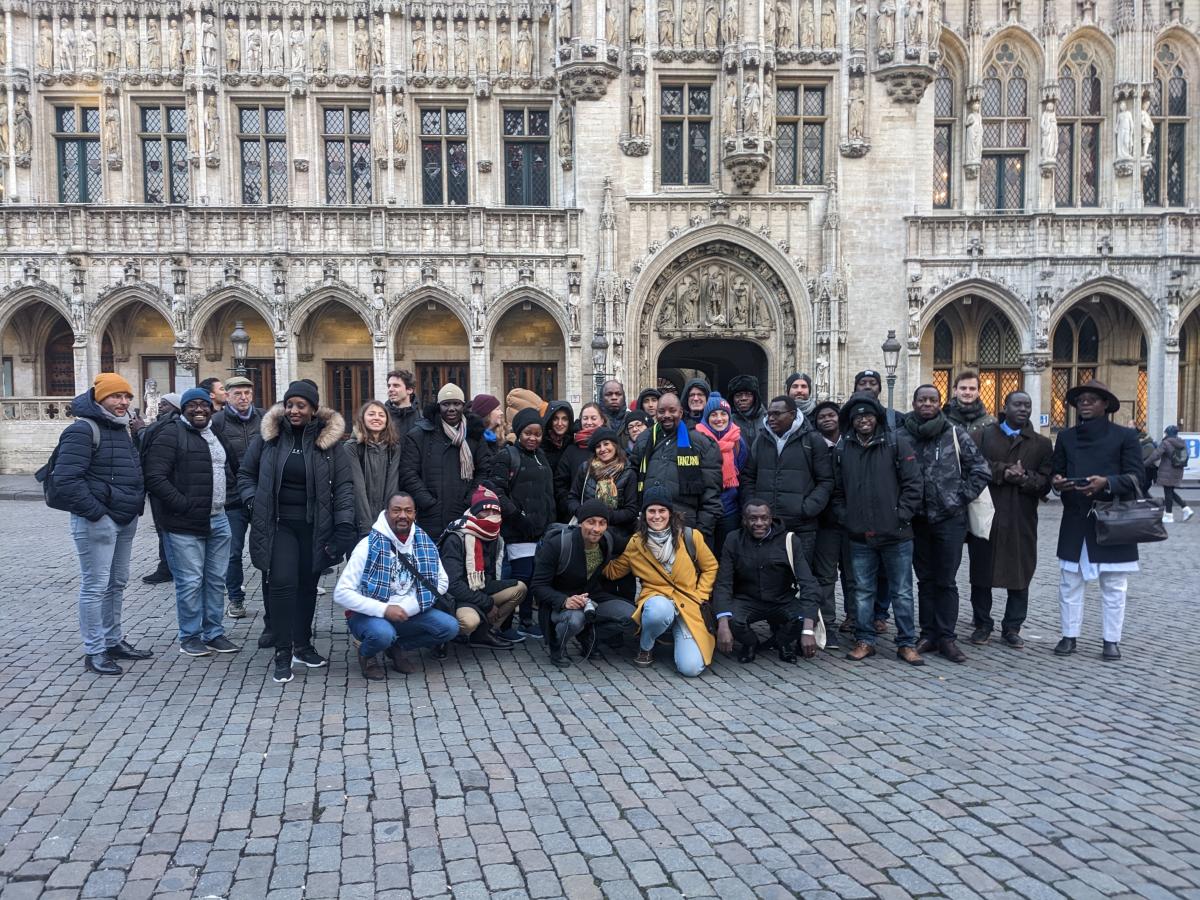
Wehubit Week: Takeaways for 2023?
Lucie BRICOUT | 20/02/2023
The Wehubit team organised the Wehubit Week in December. Almost 50 people from 12 partner countries attended the Brussels event to represent the 27 digital social innovation projects. Meanwhile, 2023 is well underway. What are the Wehubit Week takeaways that provide guidance to the programme and its partners in the new year? 1. From networking to new partnerships In addition to financial and technical support, Wehubit has developed a sizeable learning component. Indeed, the programme has its own Knowledge Exchange Network (KEN). The Wehubit Week marked the first ever face-to-face meeting with most network members attending. This has borne fruit: a new working group on innovation will soon be launched. Some of the network meetings led to further meetings being scheduled in partner countries. 2. Building bridges between Enabel's expertise and that of Wehubit's partner projects Between sessions on Principles for Digital Development, Gender and Digitisation and Scaling up Social Innovation, the Wehubit Week was a real learning event. Several Enabel experts joined forces with the Wehubit team to make this week a success. In addition to capacity building, the collaborative workshops show that there are links made or to be made between Enabel and Wehubit projects. The participants, who share similar values and goals, could learn from each other. Strengthening these links is a priority for Wehubit and will be even more so for the second Wehubit programme 3. Consolidating the Wehubit Knowledge Exchange Network (KEN) In just one and a half year, the KEN has become a dynamic and proactive network. This network has three objectives: capacity building (webinars, theoretical and practical training), partnership building and knowledge building. The Wehubit Week has significantly contributed to each of these three. But more importantly, it has opened up the network to new perspectives. The 50 partner organisations in the network have now taken ownership of the KEN. What binds these partners? The answer is multi-faceted: Digital for Development (D4D), social innovation and scaling up, the Human Rights-based Approach, etc. But the most fundamental common interest, the keystone of KEN, is learning. "Showing successes as well as failures leads to learning, opening up the field of possibilities," explains one of Wehubit's KEN members. Wehubit Week was at the heart of learning and vice versa. Do you want to learn more? Learn from the best practices and lessons learned from Wehubit's partner projects by browsing the e-library. https://www.wehubit.be/en/e-library
-
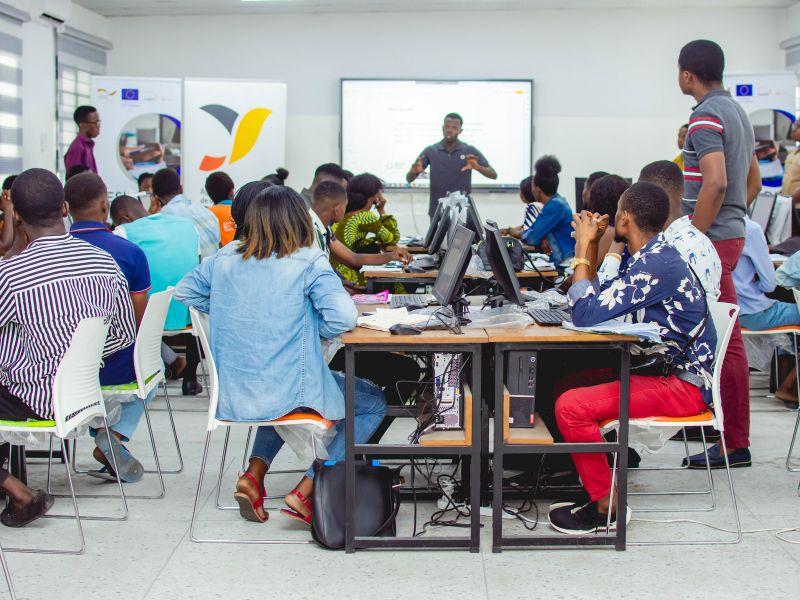
Se coder, un chemin vers un nouvel emploi (RDC)
Philippine DE BRUYN | 26/01/2023
En décembre 2022, 40 jeunes du quartier de Masina ont eu l’occasion de participer à un atelier de codage gratuit au cœur du Centre Don Bosco en partenariat avec Enabel et Kinshasa Digital Academy.L’opportunité pour eux de se former dans deux langues de code mais surtout de créer leur propre page web. Un tremplin vers de nouvelles opportunités professionnelles qui semble trouver tout son sens dans un monde se transformant à vitesse rapide et exigeant de plus en plus de compétences des jeunes désireux de se lancer sur le marché du travail. Pourquoi avoir choisi la commune de Masina ? Premièrement, le centre Don Bosco fait partie de l’un des 7 centres ayant bénéficié de la rénovation d’une classe informatique. Cette nouvelle salle est dès lors l’opportunité pour les élèves d’appréhender de nouveaux outils et profiter d’un matériel qualitatif dans l’apprentissage des outils numériques. Ensuite, Masina possède un statut particulier dans la capitale kinoise, comme nous l’explique Cedrick Ngandu Kalala, Expert digitalisation au développement chez Enabel : « Nous avions constaté qu'il y a un bon nombre d'activités et d'acteurs qui se concentrent sur la Gombe (commune de Kinshasa) et il y a, par conséquent, plus de jeunes de ces environs qui bénéficient de formations aux compétences numériques. C’est pourquoi nous avons choisi de venir dans une autre commune très peuplée et qui a tendance à être considérée défavorisée. Grâce à la rénovation récente de la salle informatique, nous avons créé un cadre favorable à la formation. De plus, avec l’appui de Kinshasa Digital Academy pour le développement de l’atelier, nous avons offerts aux jeunes de Masina cette opportunité dont nous sommes très fiers. » Et après ? Au cours des différents modules, les participant ont appris et appliqué les notions du HTML et CSS permettant, notamment, de créer des sites web. Si au terme de cette semaine, il est bien évident que les jeunes ne sortent pas directement diplômés, Cedrick Ngandu nous explique que l’objectif sous-jacent se trouve ailleurs : « En fait, notre idée c’était de déjà de susciter un intérêt dans le milieu des jeunes de la commune, démystifier un peu ce qu’est le codage et après ils pourront apprendre, par eux-mêmes, ils pourront intégrer d'autres académies de codage. Je suis persuadés que si certains sont très intéressés, ils pourront devenir de très bons codeurs. » Plongez dans l’ambiance de cette semaine au travers de notre aftermovie : https://www.youtube.com/watch?v=gpuyWW6gFwQ ***À propos de RESICODI (Résilience au COVID-19 par la digitalisation): Dans un esprit Team Europe, la GIZ et Enabel ont uni leurs forces pour tirer parti des projets existants afin d'assurer une réponse intégrée et durable au COVID-19. RESICODI soutient ainsi des initiatives en cours mises en œuvre par les deux agences :- La GIZ renforce l'initiative BACKUP Fund établie pour fournir un soutien technique et financier aux partenaires africains travaillant sur des solutions numériques pour les services d'éducation de base.- Enabel renforce les projets réussis de l'enseignement et de la formation techniques et professionnels (EFTP) et de santé pour faciliter la résilience au COVID-19. Le projet est mis en œuvre au Botswana, au Burundi, en République démocratique du Congo, à Madagascar, au Malawi, en Namibie, au Rwanda et en Zambie.
-
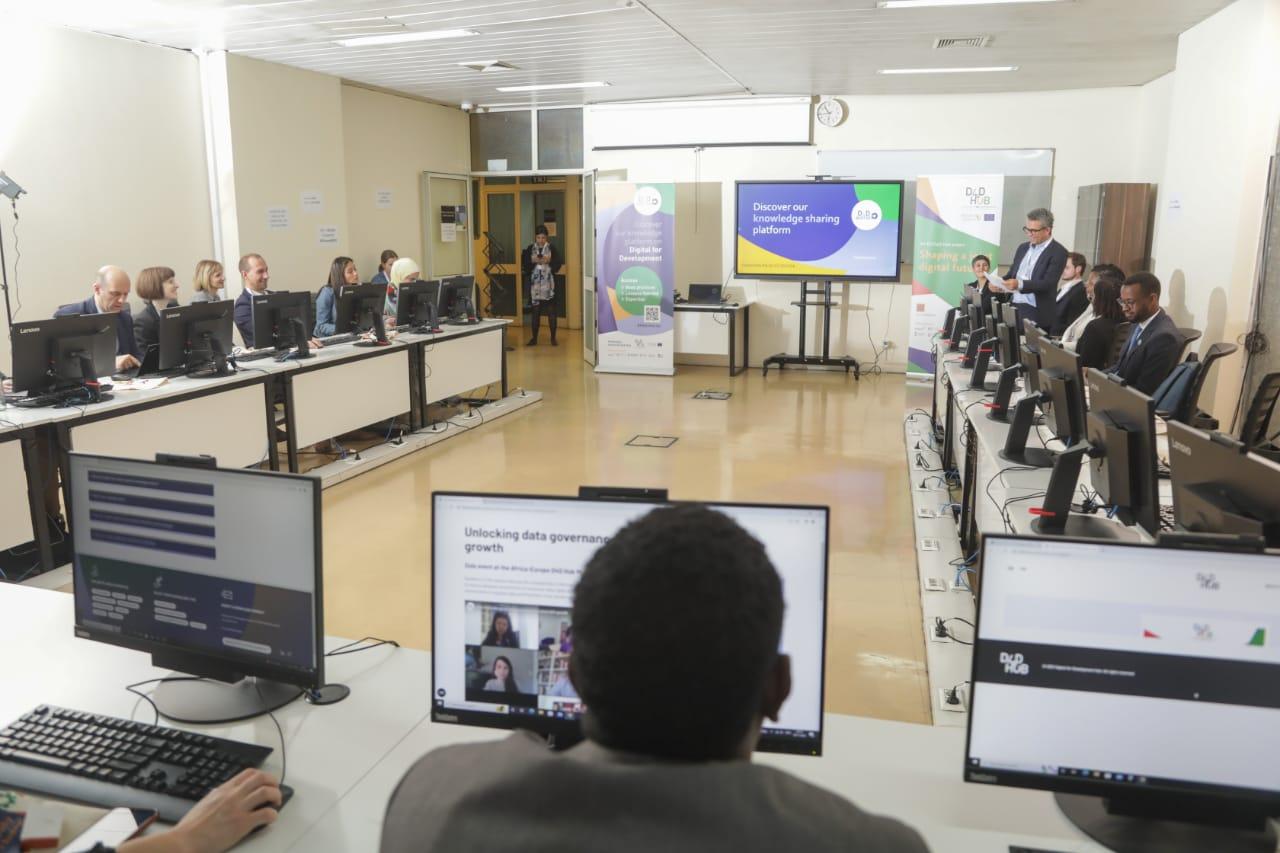
AU-EU D4D Hub launches new knowledge sharing platform “D4D Access”
Ahtziri Alejandra GONZALEZ GARCIA | 01/12/2022
The African Union - European Union (AU-EU) Digital for Development (D4D) Hub project – of which Enabel is an implementing partner – has launched a new online platform aimed at facilitating exchanges of experiences and knowledge between African and European digital actors.Called “D4D Access”, the platform covers a wide range of topics, from e-governance to digital entrepreneurship, and contains many useful resources to support digital stakeholders in Africa and Europe – including public institutions, donors, academia, companies, and civil society organisations – to advance an inclusive and sustainable digital transformation. The platform is open to all African and European organisations to share their knowledge resources on D4D, allowing them to reach new audiences, increase their visibility, host their content, and showcase their expertise. All contributions are welcome and encouraged if they align with the purpose of the platform and are relevant, insightful, and freely accessible to its target users. D4D Access is available at: www.d4daccess.eu
-
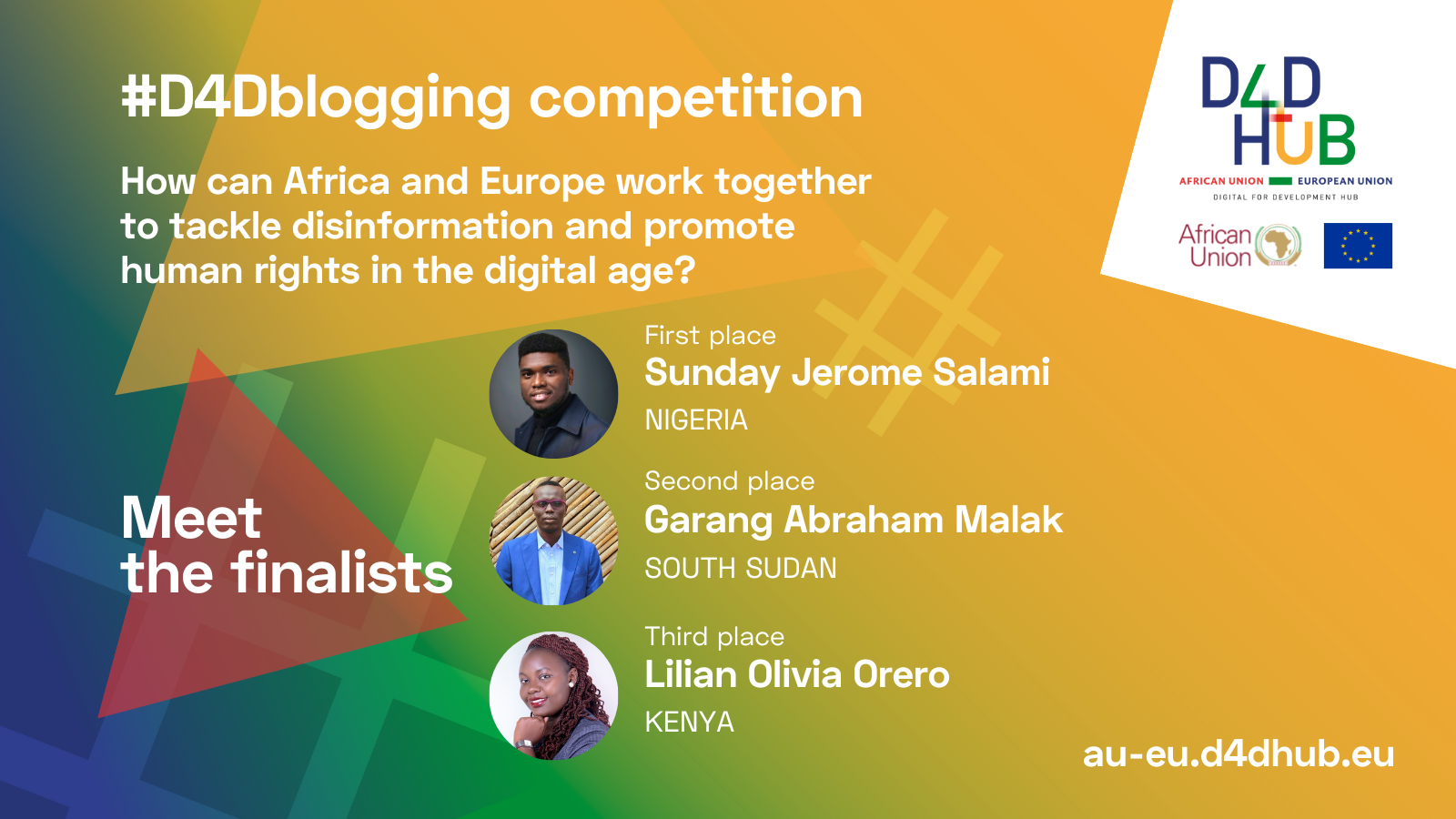
Nigerian blogger Sunday Jerome Salami wins #D4Dblogging competition on disinformation
Ahtziri Alejandra GONZALEZ GARCIA | 09/11/2022
Sunday Jerome Salami, Nigerian blogger and researcher, is the winner of the first prize in the #D4Dblogging competition, which was organised by the AU-EU Digital for Development (D4D) Hub project.The purpose of the activity was to foster debate and to gather original views on how Africa and Europe can jointly tackle online disinformation through human rights-based actions.A total of 89 entries from 27 countries were received through an open call for submissions. 60 per cent of participants were under 30 years old.Salami is a Master’s student at the School of Transnational Governance at the European University Institute in Florence, Italy. He is currently on an exchange semester at the Central European University in Vienna.The 26-year-old student runs a personal blog where he regularly writes at the intersection of his passion areas, including poverty alleviation, good governance, quality education, and sustainable development. His writings have also been published in Nigerian outlets The Metric and The Mail and Guardian.His winning blog “How can Africa and Europe work together to tackle disinformation and protect human rights in the digital age?” makes a comparison of both African and European approaches to tackling this issue, finding potential convergence points that protect digital rights. For example, he proposes including online media literacy in the school curricula and empowering grassroots organisations.The second place goes to South Sudanese journalist Garang Abraham MalakThe second finalist of the competition was South Sudanese multimedia journalist, blogger, media trainer, and fact-checker Garang Abraham Malak.Malak, whose writings have appeared on South Sudanese and international outlets such as Eye Radio, Nation Media Group, and the BBC, is a regular blogger about politics, human rights and governance, justice, conflict, security, and the environment.His blog “To win the war on disinformation, Africa and Europe need long-term strategic partnerships” builds on his own experience tackling disinformation as a researcher and media professional. The 28-year-old blogger is the co-author of a best practice manual called “Hate Speech and Misinformation Guide for the Media” which provides South Sudanese media with practical guidance on how to deal with hate speech, misinformation, and online incitement to violence.He provides many concrete recommendations on how to advance Africa-Europe cooperation in this field. For instance, he proposes creating a joint awareness-raising campaign with committed influencers, building the capacity of alternative media and fact-checking organisations, and creating bridges between civil society organisations on both continents.Kenyan lawyer Lilian Olivia Orero wins third placeFinally, 27-year-old international human rights lawyer and researcher Lilian Olivia Orero was recognised in the third place. Native from Kenya, Orero has a strong interest in data governance, gender equality, and digital rights – issues about which she regularly writes.Her entry “Balancing the protection of fundamental rights in the fight against disinformation” brings a human rights perspective on how legislation to tackle disinformation could curtail people’s freedom of speech, open internet, and digital rights. According to Orero, the key to striking the right balance is to promote collaborations between civil society organisations and the media.Fostering an open debate on disinformation“Digitalisation offers enormous opportunities to promote sustainable development in our societies, but it also poses new challenges such as the spread of online disinformation, which threatens our democracies and puts people at risk,” said Carla Montesi, Director for Green Deal and Digital Agenda at the European Commission’s Directorate-General for International Partnerships (DG INTPA), during the announcement of the competition results.“This is why through the AU-EU D4D Hub, we are supporting a much-needed conversation with our African partners on how we can work together to tackle this issue, while at the same time avoiding measures that violate human rights – such as Internet shutdowns, online censorship, or increased surveillance. We were delighted to receive so many concrete ideas through this blogging competition, and we look forward to continuing the debate,” she added.The three blogs will be published by the AU-EU D4D Hub in the lead-up to the Town Hall session “Jointly tackling disinformation and promoting human rights”, which will be held on 2 December at the Internet Governance Forum 2022 (hybrid event).
-
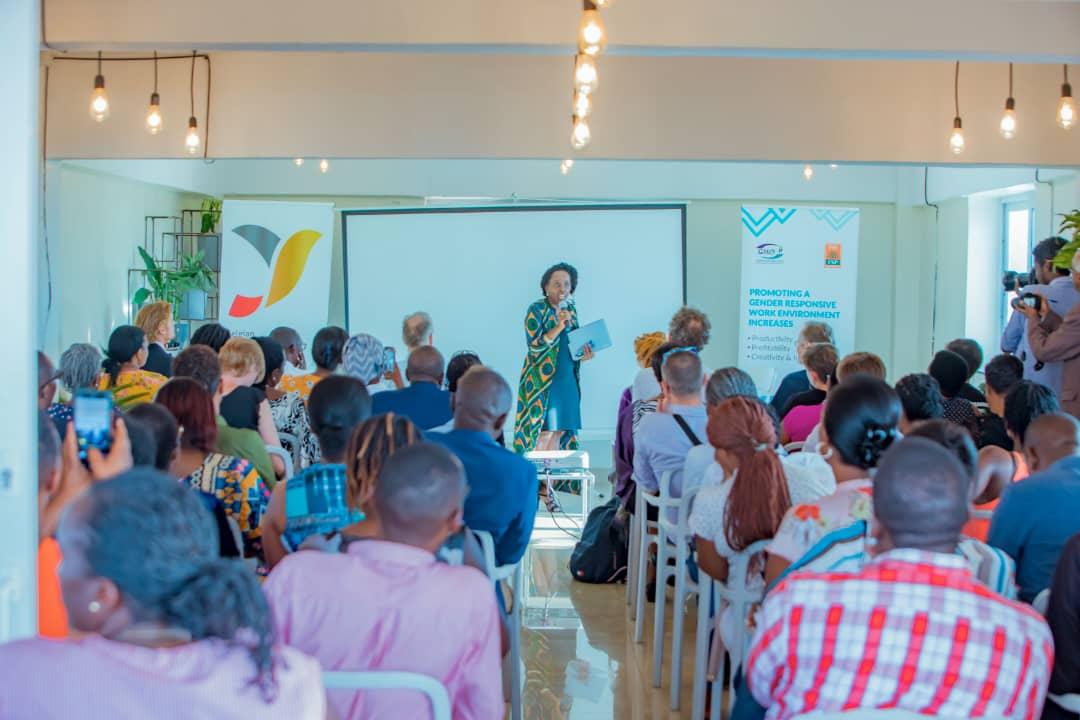
Enabel and Gender Monitoring Office celebrate Rwandan women entrepreneurs with the launch of a new project
Tom CROHIN | 19/10/2022
Kigali, 14 October 2022 – More than 80 people gathered to discuss the socio-economic impact of women’s entrepreneurship in Rwanda. Initiated by Enabel, the Belgian development agency in partnership with Rwanda’s Gender Monitoring Office (GMO), the Ministry of Gender and Family Promotion (MIGEPROF) and the National Industrial Research and Development Agency (NIRDA) , this event took place on the occasion of the launch of the Awa Prize, a new international contest for women entrepreneurs. On this occasion, a large audience composed of entrepreneurs, private sector development experts, government bodies were invited to join the crucial conversation on women’s entrepreneurship as a tool for socio-economic development of urban and rural communities. The evening was introduced by Jean-Michel Swalens, Head of Cooperation at the Embassy of Belgium in Rwanda.Concerned with the topic of gender equality on society at large, he said : “Belgian cooperation is committed to supporting Rwanda in creating an increasingly favorable environment for entrepreneurship with particular attention to women. The Awa Prize initiative will be of great help to succeed!”To lead the discussion, four experts took part in a round table to share their expertise and viewpoints on this paramount question : Francine Munyaneza from Munyax Eco, Florien H. Rurihose, Deputy Chief of the Gender Monitoring Office (GMO), Annette Mukayiranga from the National Industrial Research and Development Agency (NIRDA) and Sifa Florence Sangwa, agriculture student. The conversation started around the topic of family life and its impact on the creation of a company for a woman. It appeared that while a family can be a great source of support, relatives’ concerns, as caring as they are, can also be a brake. In the agricultural sector, and especially in rural areas, some challenges can be more difficult to tackle for women entrepreneurs. A better access to information, by communicating through the relevant medias will enable more women from rural areas to access the opportunities they may not be aware of. The importance of building relevant programs for women was also stressed. According to several participants in the attendance, women’s needs and voice need to be taken into account in the very conception of such support initiatives. “Women are not statistics!” said Annette Mukayiranga, from NIRDA. “Women need to be treated the same way as men when it comes to entrepreneurship.” Besides the potential solutions formulated throughout the discussions, one idea often appeared as an important basis for a better distribution of opportunities in entrepreneurship : the importance of fellowship, mutual support and strong networks of women entrepreneurs. The round table was the first of a series of events around women entrepreneurship which will be organized by Enabel in the four upcoming years as part of the Awa Prize, a new international competition for women entrepreneurs in all partner countries of the Belgian development agency. This project aims at shedding the light on women who animate their communities with their business. Rwandan entrepreneurs are invited to apply on the website of the project until October 24.
-
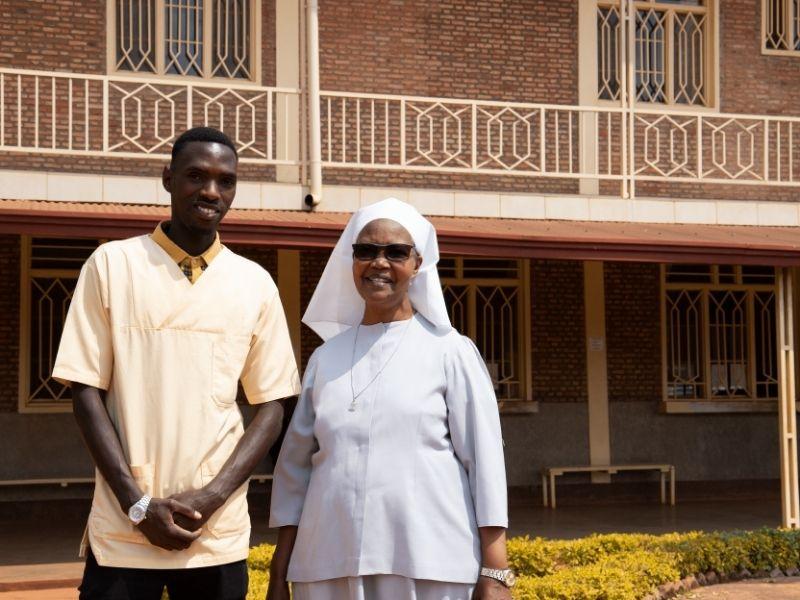
La digitalisation au service des soins de santé - Visite du Centre Sainte Thérèse (Burundi)
Philippine DE BRUYN | 22/09/2022
Dans le cadre du programme de résilience au COVID-19 grâce à la digitalisation (co-financé par l’Union Européenne et implémenté par Enabel), un appel à candidature a été lancé pour solliciter des hôpitaux intéressés d’implémenter de nouvelles solutions digitales au sein de leurs services. En quoi cela consiste-t-il ? Quelles sont les étapes d’une telle transition ? L’hôpital Sainte-Thérèse nous a ouvert ses portes pour découvrir les premières étapes de sa transition vers la digitalisation de ses infrastructures.Après avoir collaboré à l’installation des panneaux solaires et serveurs permettant les prémices d’une connexion stable, le travail préparatoire est en cours et Dr Sœur Lamberta Nakabandi, la directrice, nous explique ce qu’elle attend de ces nouvelles installations.Un suivi des patients et qualité de services améliorésGrâce à la digitalisation des fiches patients, l’hôpital espère d’une part, pouvoir garantir un suivi qualitatif et rapide en termes de pathologies et soins et d’autre part, soulager le personnel soignant de nombreuses tâches administratives afin de leur permettre de se concentrer sur les soins. De plus, le personnel administratif entrevoit avec ces nouvelles technologies et matériel, une opportunité d’un meilleur suivi au niveau des factures et dossiers leur permettant de économies de coût. De plus, en digitalisant certains aménagements, le personnel soignant obtiendra l’opportunité de contacter des collègues parfois situé à de grandes distances pour solliciter leur expertise et conseils.« Grâce à la digitalisation, l’autre connait ce que je connais. C’est important d’assurer un suivi du patient et ça allège d’autres services comme la réception ou encore la facturation (…). Nous espérons pouvoir développer un meilleur suivi des factures pour assurer l’économie de l’hôpital. »Un gain d’espaceIl n’est pas rare de voir de nombreux dossiers s’accumuler dans les armoires et de prendre certains espaces qui pourraient permettre d’être utilisés à de véritables objectifs de santé. C’est pourquoi la digitalisation est également accueillie à ce niveau comme une bouffée d’air frais.L’équipe soignante et directrice est bien évidemment consciente que ces aménagements impliquent des changements organisationnels et budgétaires afin de pouvoir poursuivre, sur le long terme, l’entretien et l’utilisation du matériel. Dans cette dynamique, les équipes du projet et de l’hôpital collaborent de manière étroite afin de garantir une implémentation pérenne et de long terme. « Les équipes soignantes accueillent très positivement l’arrivée de la digitalisation car ils espèrent pouvoir être plus rapidement en contact avec d’autres centres de santé plus éloignés mais surtout se concentrer sur leurs tâches médicales plutôt que devoir se perdre dans beaucoup de dossiers papiers. »Découvrez son témoignage en vidéo en cliquant ici.***Quelques mots au sujet de RESICODI (Résilience au COVID-19) par la digitalisationDans un esprit Team Europe, la GIZ et Enabel ont uni leurs forces pour tirer parti des projets existants afin d'assurer une réponse intégrée et durable au COVID-19. RESICODI soutient ainsi des initiatives en cours mises en œuvre par les deux agences :La GIZ renforce l'initiative BACKUP Fund établie pour fournir un soutien technique et financier aux partenaires africains travaillant sur des solutions numériques pour les services d'éducation de base.Enabel renforce les projets réussis de l'enseignement et de la formation techniques et professionnels (EFTP) et de santé pour faciliter la résilience au COVID-19.Le projet est mis en œuvre au Botswana, au Burundi, en République démocratique du Congo, à Madagascar, au Malawi, en Namibie, au Rwanda et en Zambie.
-
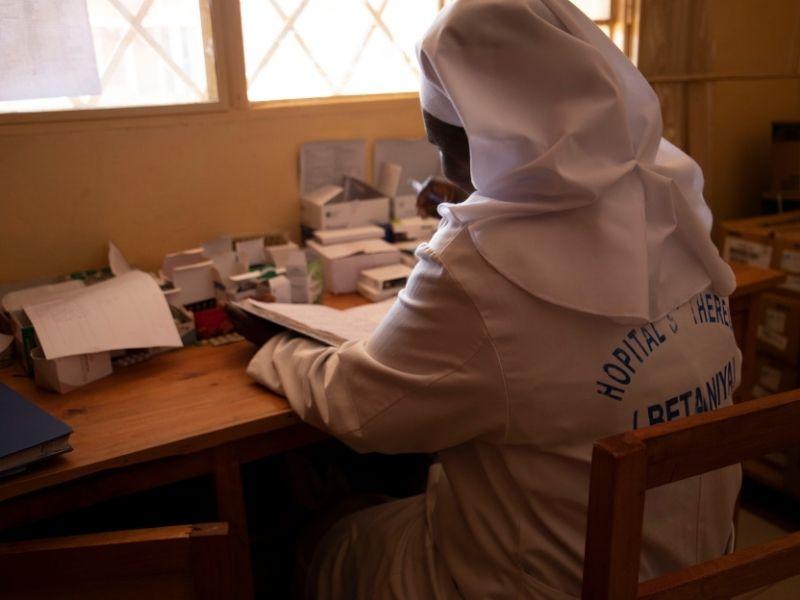
Digitalisation des hôpitaux au Burundi : une amélioration de la vie de l’hôpital ?
Philippine DE BRUYN | 22/09/2022
Au Burundi, le projet de Résilience au COVID-19 par la digitalisation (RESICODI) appuie des solutions existantes dans le système de santé avec de nouveaux outils numériques dans le but de les renforcer et garantir un service de qualité aux patients et personnel soignant.Spès caritas Ndayishimiye, gestionnaire de projet d’appui au système national d’informations sanitaires (Enabel), nous explique en quoi consiste l’approche de digitalisation du projet.Mise en place de 3 activités principales Mise en place des tableaux de bord COVID-19 en vue d’une prise de décision éclairée en matière de COVID-19 Informatisation de 4 hôpitaux en mettant un accent particulier sur les aspects de COVID-19 Formations à l’attention des différents prestataires basées sur le e-learning et tous les aspects COVID-19 tels que la prise en charge, la sensibilisation ou encore l’hygiène La digitalisation, un atout pour les services de santé ? En étant en contact permanent avec les institutions de santé, il est maintenant clair que la digitalisation s’impose comme une plus-value pour le système existant. Tout d’abord, grâce à certains outils numériques, le circuit du patient est réduit et sa prise en charge est facilitée dans la continuité. Ensuite, pour le personnel soignant, les tâches sont également moins redondantes. La centralisation des informations permet de laisser le personnel hospitalier sur des questions cruciales sans se perdre dans de nombreux documents et tâches administratives. D’autre part, la gestion des ressources financières et médicamenteuses est également automatisée et permet de gagner en transparence. En termes de prestations, tout est centralisé avec des tarifs corrects, ce qui peut éviter de nombreux litiges. “La digitalisation, même si nous nous trouvons dans un contexte de pays fragile avec certaines conditions incertaines comme la disponibilité d’énergie, apporte une plus-value dans le secteur de la santé.”Un défi majeur : garantir la pérennité des actions de digitalisationLa digitalisation génère une plus-value financière, il dès lors important de pouvoir sensibiliser les hôpitaux à cette plus-value et que celle-ci ne soit pas directement dépensée. C’est pourquoi, en mettant en place les solutions numériques, les équipes sensibilisent l’hôpital sur les implications d’installation d’un tel matériel (entretien, réparations…) et qu’il est nécessaire de prévoir des lignes budgétaires à cet effet.“Nous espérons qu’avec une digitalisation à plus grand échelle dans le secteur des soins de santé, le marché local arrivera à disponibiliser du matériel pour que les hôpitaux parviennent à s’approvisionner localement sans être dépendants de l’importation.”En ce qui concerne les ressources humaines, la formation est primordiale. Formation du personnel utilisateur mais également des informaticiens qui doivent soutenir l’administration et l’installation du système. Un véritable plaidoyer est mis en place pour que chaque hôpital puisse disposer d’un informaticien au sein de son équipe. La formation certifiante (CISA) organisée en présentiel et spécifique aux besoins rencontrés dans le secteur.Découvrez en images le témoignage de Soeur Lamberta Nakabandi (Hôpital Sainte-Thérèse de Gitega) en cliquant ici.***Quelques mots au sujet de RESICODI (Résilience au COVID-19) par la digitalisationDans un esprit Team Europe, la GIZ et Enabel ont uni leurs forces pour tirer parti des projets existants afin d'assurer une réponse intégrée et durable au COVID-19. RESICODI soutient ainsi des initiatives en cours mises en œuvre par les deux agences :La GIZ renforce l'initiative BACKUP Fund établie pour fournir un soutien technique et financier aux partenaires africains travaillant sur des solutions numériques pour les services d'éducation de base.Enabel renforce les projets réussis de l'enseignement et de la formation techniques et professionnels (EFTP) et de santé pour faciliter la résilience au COVID-19.Le projet est mis en œuvre au Botswana, au Burundi, en République démocratique du Congo, à Madagascar, au Malawi, en Namibie, au Rwanda et en Zambie.
-
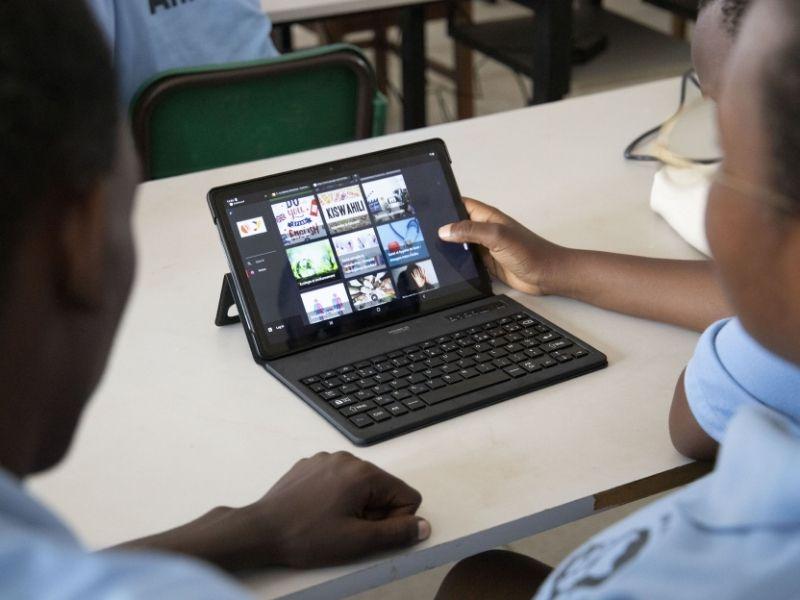
Renforcer le système d’enseignement au Burundi par des outils digitaux, une véritable bonne idée ?
Philippine DE BRUYN | 22/09/2022
Au Burundi, dans le cadre d’un projet de résilience au COVID-19 par la digitalisation (RESICODI) co-financé par l’Union Européenne, 8 centres de formation des métiers sont en phase de lancer leurs nouveaux outils digitaux et permettre aux apprenants d’appréhender de nouvelles techniques numériques. En quoi cela a-t-il un impact sur l’organisation du centre et des enseignants ? Qu’en pensent les apprenants ? Découvrez au travers de témoignages variés les défis et attentes que représentent cette transformation.“J’espère que le centre de formations de Rutana fera office d’exemple pour les autres centres et écoles des alentours. En organisant des visites régulières avec d’autres apprenants et formateurs des écoles aux alentours, nous espérons que l’envie d’apprendre des nouvelles technologies puisse toucher un public plus large et que les communautés prennent conscience de l’importance de l’intégration du numérique dans l’enseignement.” - Siméon NGENZEBUHORO, Directeur Provincial de l’Enseignement de Rutana (DPE) “Enabel nous a appuyé dans le processus de création de contenus qui se trouvent par la suite dans les serveurs. Grâce à ces outils nous avons maintenant accès à distance à beaucoup de ressources sans devoir faire de nombreux kilomètres. Cela va vraiment nous aider dans la qualité de l’enseignement” - Jean Népomuscene NAHIMANA, Directeur technique (CPF Buterere) “Dans notre secteur de l’enseignement des métiers qui peut sembler moins attrayant au Burundi, nous espérons que les outils numériques vont rendre certaines filières plus attractives et que les apprenants seront encore plus motivés. (…) Nous avons déjà organisés des visites de sensibilisation pour les inciter à venir fréquenter et découvrir notre centre. Nous espérons qu’en plus d’inspirer les futurs apprenants, ce sera aussi une opportunité pour les enseignants de venir préparer leurs cours et intégrer le numérique dans leur enseignement.” - Claver NITUNGA, Directeur du Centre d’Enseignement des Métiers de Gitaba “Je suis d’avis que les outils qui sont arrivés dans notre centre vont nous faciliter la vie dans notre travail quotidien. Ce n’est pas une charge de travail supplémentaire. Cela va nous permettre de réaliser plus de recherches, approfondir nos cours et en même temps permettre aux apprenants de se familiariser avec l’outil numérique. (…) Cela me donne un véritable avantage au niveau de la profession et je n’ai pas envie de revenir à l’ancienne méthode. Maintenant je peux exploiter le manuel à disposition mais aussi des ressources complémentaires qui permettront de compléter ce qui est prévu dans le manuel pour corriger les lacunes ou permettre de mieux s’adapter aux exigences futures.” Fidèle NIYONKURU, Formateur non-ICT (CFP Mugerama) “Je pense qu’il est important que nous disposions dans le futur des équipements suffisants et beaucoup de formateurs qui s’y connaissent en technologies de l'information et de la communication (TIC), sans oublier la sensibilisation d’autres jeunes sur l’importance de la digitalisation.” Linka Niganze - Apprenante (CPF Buterere) “En ce qui concerne l’entretien du matériel, je suis persuadé que l’école va pouvoir s’arranger pour assurer une maintenance avec les profits ramenés de chaque filière. De plus, avec la formation que j’ai suivie j’ai pu développer certaines compétences en entretien de matériel informatique. En tant que formateur, je veux aussi m’engager à garantir l’utilisation et le bon fonctionnement du matériel de la salle informatique. Il sera aussi important de sensibiliser les apprenants et la direction de l’école à ne pas endommager et préserver ce que nous avons reçu. Nous avons donc transmis des doléances au directeur afin de nous procurer le bon matériel d’entretien également.” - Frederic MINANI, Formateur ICT (CFP Mugerama)“Depuis que le numérique a été intégré dans l’enseignement de notre centre, il y a eu une véritable valeur ajoutée par rapport à la qualité de la formation. L’apprentissage devient facile car il peut être matérialisé par une vidéo sur le serveur Ideas Cube.” - Joselyne NIYOMWUNGERE, Formatrice (CPF Buterere)Découvrez les différents témoignages en vidéo en cliquant ici.Quelques mots au sujet de RESICODI (Résilience au COVID-19) par la digitalisationDans un esprit Team Europe, la GIZ et Enabel ont uni leurs forces pour tirer parti des projets existants afin d'assurer une réponse intégrée et durable au COVID-19. RESICODI soutient ainsi des initiatives en cours mises en œuvre par les deux agences :La GIZ renforce l'initiative BACKUP Fund établie pour fournir un soutien technique et financier aux partenaires africains travaillant sur des solutions numériques pour les services d'éducation de base.Enabel renforce les projets réussis de l'enseignement et de la formation techniques et professionnels (EFTP) et de santé pour faciliter la résilience au COVID-19.Le projet est mis en œuvre au Botswana, au Burundi, en République démocratique du Congo, à Madagascar, au Malawi, en Namibie, au Rwanda et en Zambie.
-
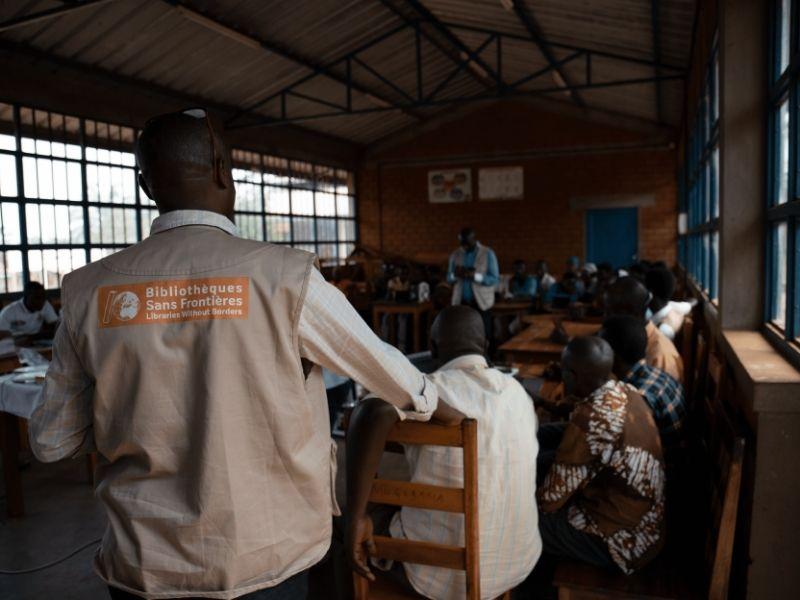
Bibliothèques numériques au Burundi - 4 questions à Arthémon Bayisaba, Chargé de Projets Formation Professionnelle chez Bibliothèques sans Frontières
Philippine DE BRUYN | 22/09/2022
Dans le cadre du projet de Résilience au Covid-19 par la digitalisation (RESICODI), Enabel collabore au Burundi avec l’ONG Bibliothèques sans Frontières. La semaine de sensibilisation au numérique organisée dans plusieurs provinces fut une opportunité de rencontrer Arthémon Bayisabe et d’échanger avec lui au sujet du partenariat entre Enabel et l’ONG.Comment le partenariat avec Enabel a-t-il vu le jour ?Il faut savoir que le partenariat n’est pas nouveau. D’après moi, il existe depuis déjà 2016-2017. Ça s’est principalement matérialisé par un déploiement des bibliothèques numériques dans les centres d’enseignement des métiers avec l’objectif de redynamiser ces centres par des supports et des ressources pédagogiques innovantes mais surtout adaptées au contexte de la formation professionnelle. Bibliothèques sans Frontières vient donc davantage comme un appui avec du contenu spécifique et adapté au contexte de l’enseignement des métiers au Burundi.Comment les centres partenaires accueillent-ils ces solutions ? Au niveau de l’enseignement des métiers, on enseigne généralement dans le classique c’est-à-dire que la théorie, c’est la pratique. Avec l’arrivée de ces bibliothèques, les centres ont vu une concrétisation de la théorie pour pouvoir avancer avec les pratiques parce qu’on utilise un nouveau matériel tel que les projecteurs et les tablettes. Quel est le plus gros défi ? La limite de temps. Je vois dans mon travail au jour le jour que la digitalisation est un véritable changement dans les habitudes et que cela nécessite du temps pour que les personnes utilisent le matériel et que la solution soit pérenne sur le plus long terme. Si les ressources ne sont pas bien implémentées, ma crainte c’est que par la suite le matériel soit mal entretenu voire plus du tout utilisé. C’est pourquoi il est très important de continuer à sensibiliser les gens. La digitalisation dans ce cas n’est-elle pas une charge de travail en plus pour les formateurs qui doivent adapter leurs manières de travailler ?Premièrement il faut savoir que nous avons un problème dans le pays car la plupart des communautés n’ont pas facilement accès à l’information et à la formation. Via ces outils numériques donnés par Enabel c’est vraiment une plus-value. Ça permettra à toute cette région, population plus reculée d’avoir accès à ces informations. Dans le cadre du projet RESICODI, je dois dire que je suis enchanté car l’approche mise en place a permis aux centres de bien utiliser les ressources. Je peux le voir de mes propres yeux, ça ajoute une qualité supplémentaire à l’enseignement. D’ailleurs, dans le centre que nous sommes en train de visiter à Gitaba, la présentation du kit des bibliothèques numériques a été réalisée par un élève, pas un enseignant donc vous voyez que c’est une solution qui bien appréciée. Quelques mots au sujet de la dynamique entre Enabel et BSF (Paulien Caeyers, Experte junior en digitalisation pour le développement)L’installation des Ideas Cubes dans les 8 centres au sein du projet RESICODI est la dérivation d’une pratique existante au Burundi : les bibliothèques numériques dans les Centres d'Enseignement des Métiers (voir projet ACFPT « Appui Complémentaire à la Formation Professionnelle et Technique"). Au sein d’ACFPT, 13 kits Koombooks (ancienne version de l'Ideas Cube) avaient déjà été installés en 2018. La principale leçon tirée de ces installations est que l'accueil de cet outil dépend fortement du contenu proposé. Un formateur qui trouve le matériel sur le serveur pertinent pour son cours sera prêt à adapter sa pratique quotidienne d’enseignement pour y insérer des contenus digitaux. C'est la raison pour laquelle, dans le cadre de RESICODI, un diagnostic des besoins très approfondi a été prioritaire avant d'entamer l'installation des Ideas Cubes. Pendant plusieurs ateliers, nous avons impliqué les chefs de filières, les directeurs techniques et les experts du Ministère afin d’identifier le contenu pertinent à ajouter aux serveurs. Nous avons même créé 60 nouvelles capsules vidéo sur des thèmes jugés importants qui n’étaient pas encore disponibles dans la base de données de BSF. Ces vidéos sont tournées dans les Centres d'Enseignement des Métiers (CEM) partenaires et chez les artisans locaux. Grâce à cette attention particulière et l’implication des centres partenaires, nous espérons maintenant que le contenu des Ideas Cubes soit le plus adapté possible aux besoins exprimés par les formateurs. Le fait que les filières enseignées dans les CEM au Burundi sont en grande partie les mêmes et nous sommes heureux d'assister à la synergie des deux projets RESICODI et ACFPT. Quelques mots au sujet de RESICODI (Résilience au COVID-19) par la digitalisationDans un esprit Team Europe, la GIZ et Enabel ont uni leurs forces pour tirer parti des projets existants afin d'assurer une réponse intégrée et durable au COVID-19. RESICODI soutient ainsi des initiatives en cours mises en œuvre par les deux agences :La GIZ renforce l'initiative BACKUP Fund établie pour fournir un soutien technique et financier aux partenaires africains travaillant sur des solutions numériques pour les services d'éducation de base.Enabel renforce les projets réussis de l'enseignement et de la formation techniques et professionnels (EFTP) et de santé pour faciliter la résilience au COVID-19.Le projet est mis en œuvre au Botswana, au Burundi, en République démocratique du Congo, à Madagascar, au Malawi, en Namibie, au Rwanda et en Zambie.
-
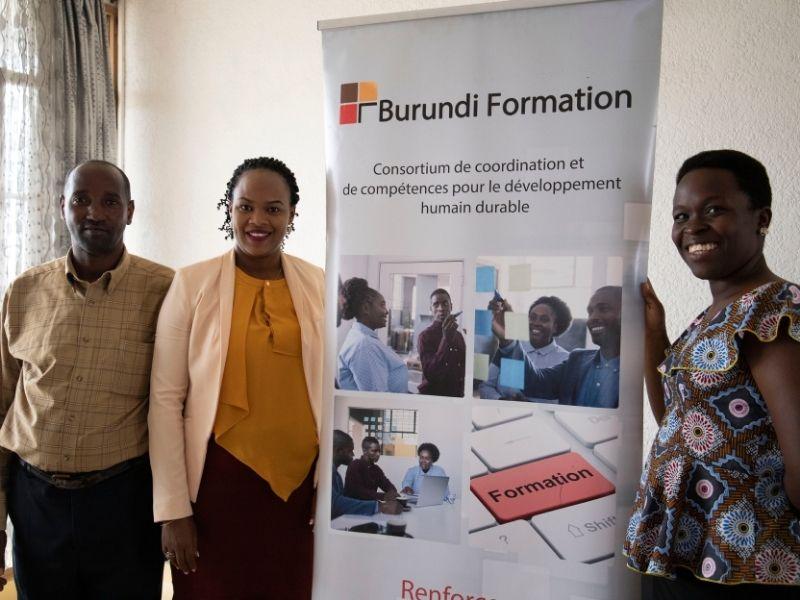
Burundi: Ouvrir de nouvelles opportunités professionnelles grâce aux formations en numérique
Philippine DE BRUYN | 22/09/2022
Dans le cadre du projet de Résilience au COVID-19 par la digitalisation Ils nous parlent des avantages mais aussi des défis qu’ils entrevoient dans la formation de professeurs aux outils digitaux. (RESICODI), Enabel en tant que partenaire d’implémentation pour le co-financement de l’Union Européenne collabore avec le prestataire de service “Burundi Formation”. Récit d’une rencontre avec Diane Ndayikeza (Directrice Générale des Opérations), Ella Munezero (Formatrice ICT) et Apollinaire Nahimana (formateur non-ICT).Dans le cadre du partenariat avec Enabel, Burundi Formation organise des séances de suivi et d’accompagnement à l’attention des formateurs ICT et non-ICT de Centres d’Enseignement des Métiers et Centres de Formation Professionnelle. Le but est de pouvoir renforcer leurs compétences techniques et pédagogiques ainsi que se familiariser avec l’utilisation des outils informatiques et numériques afin de pouvoir transférer ces compétences par la suite dans leurs centres respectifs.Pour Ella Munezero, formatrice ICT, “la digitalisation ne s’apparente pas à une charge de travail supplémentaire pour les enseignants”. Pour elle la digitalisation s'apparente donc à une opportunité pour les formateurs car cela leur ouvre de nouveaux horizons dans leur développement professionnel. Ella est confiante sur la suite du processus quand elle voit l’implication des formateurs même après les différentes formations. La formatrice s’enthousiasme de l’ambiance des apprenants pendant les séances d’apprentissage : « Il faut vraiment regarder les apprenants en train de suivre les cours. On dirait qu’ils ont une nouvelle vie, qu’ils ont en quelques sortes développé une nouvelle motivation car on leur a ouvert d’autres horizons».De son côté, Apollinaire Nahimana, formateur non-ICT souligne l’importance d’être conscient des limitations matérielles encore bien présentes dans certains endroits du pays mais de ne pas oublier à quel point il est maintenant crucial de former ces formateurs pour qu’ils puissent transmettre à leur tour leurs bonnes pratiques. « La découverte des outils numériques a été pour certains une véritable révolution. Certains désiraient même rester pour s’entrainer et faire leurs exercices pendant les moments de pause», précise Apollinaire Nahimana.Quelques mots au sujet de Burundi FormationBurundi Formation est un consortium de coordination et de compétences pour le développement humain durable. En d’autres mots, l’organisation développe des formations sur des sujets divers et variés permettant un meilleur développement des compétences au Burundi. L’organisation a été créée par des partenaires nationaux et internationaux lui permettant de mobiliser des acteurs aux compétences variées et provenant d’horizons divers.Quelques mots au sujet de RESICODI (Résilience au COVID-19) par la digitalisationDans un esprit Team Europe, la GIZ et Enabel ont uni leurs forces pour tirer parti des projets existants afin d'assurer une réponse intégrée et durable au COVID-19. RESICODI soutient ainsi des initiatives en cours mises en œuvre par les deux agences :La GIZ renforce l'initiative BACKUP Fund établie pour fournir un soutien technique et financier aux partenaires africains travaillant sur des solutions numériques pour les services d'éducation de base.Enabel renforce les projets réussis de l'enseignement et de la formation techniques et professionnels (EFTP) et de santé pour faciliter la résilience au COVID-19.Le projet est mis en œuvre au Botswana, au Burundi, en République démocratique du Congo, à Madagascar, au Malawi, en Namibie, au Rwanda et en Zambie.
-
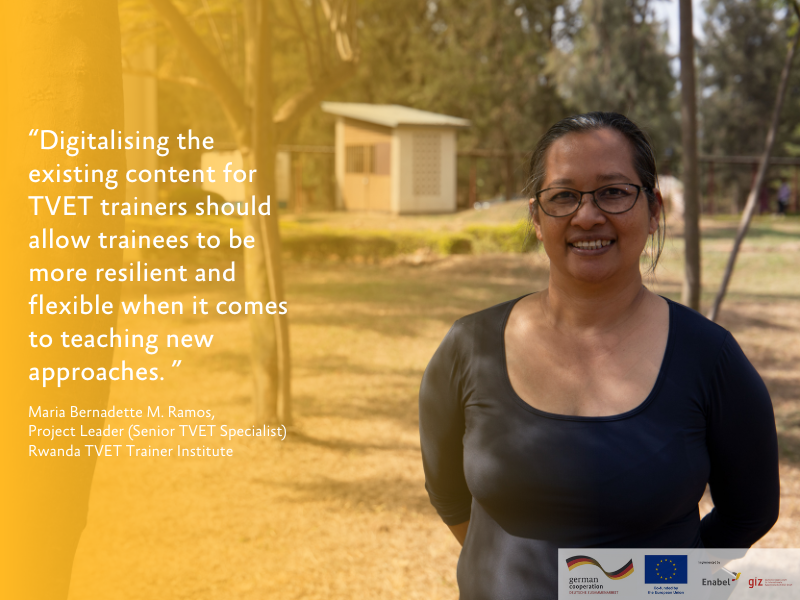
Rwanda TVET Trainer Institute (RTTI), partner in digitalising TVET education in Rwanda
Philippine DE BRUYN | 20/09/2022
Within the framework of the Resilience to COVID-19 Action, Enabel as implementing partner has joined forces with RTTI (Rwanda TVET Trainer Institute) to develop content for TVET centers. To clearly understand what it means to partnership in this kind of context, meet Maria Bernadette M. Ramos, project leader (Senior TVET Specialist).Located at the Integrated Polytechnic Regional Centre (IPRC) Kicukiro, Rwanda Technical Teachers Training Institute (RTTI) has been established in 2018. Since then, this training institute has provided regular updates in technical skills, a boost for vocational and technical teachers who have been using the old curriculum. On a permanent basis the institute hosts over 60 Technical and Vocational Education Teachers for trainings in pedagogical skills in respective areas of profession for a period of two weeks. The objective is to gather teachers to be trained and obtained a specific certification.Within the framework of the RESICODI project, TVET certificate courses are currently being digitalised and uploaded on the Rwanda Polytechnic platform. The aim is support trainers in the implementation of blended learning regarding their teaching approach. From her opinion, this approach could not only benefit students but also teachers that will bring their teaching method to the next level. As highlighted by Maria Bernadette M. Ramos, the biggest challenges at this point are time and getting access to a good connection and infrastructures in every district. Nevertheless these limitations do not discourage RTTI and Enabel in their joint efforts to deliver qualitative and easy content for senior teachers. About RESICODI (Resilience to COVID-19 through digitalisation)In response to the global crisis caused by the COVID-19 pandemic, the European Commission and the High Representative announced an EU global response strategy to fight the pandemic in April 2020. Part of the EU COVID-19 emergency response is the Action “Resilience to COVID-19 through Digitalisation” (RESICODI). This Action is co-funded by the European Union and the German Federal Ministry of Economic Cooperation and Development (BMZ) and is jointly implemented by Enabel and GIZ (Team Europe Approach).
-

Boosting digital literacy, what does it mean? - Reactions from partners and actors of the RESICODI Action (Rwanda)
Philippine DE BRUYN | 20/09/2022
COVID-19 highlighted limits in the traditional way of teaching. The digital transformation for increased resilience has not been self-evident everywhere, with the digital divide only becoming more apparent. Eastern and Southern African countries had at that time also temporarily closed educational institutions, affecting learners at all levels. Lack of continued quality education dramatically deepened existing social inequalities and might even destabilise societies in the future. In 2020, 82 % of learners in sub-Saharan Africa did not have access to the internet. As countries are exploring the use of e-learning, many are lacking sufficient support to provide quality digital education aligned with the national curricula that reaches a large proportion of pupils and students and ensure inclusive access for rural populations.The start of the school year is a good opportunity to discover the activities and infrastructures that have already been implemented, but above all to get the opinion of partners, school directors and teachers directly affected by these initiatives. “Thanks to this software (Moodle in combination with H5P) I can now create my own content and use new technological tools. It allows me to facilitate my daily tasks and create more interactions with my colleagues.” Marie-Rose Abayisenga – CBA VERIFIER (Competence based Assessment), IPRC Kitabi.“During the trainings I have realised that using digital content and tools make my course more interactive. It allows me to give some tasks to students remotely and then giving concrete feedback. We have created more interactions between trainers and trainees and I find it very pleasant. (…) Besides I can say that we are now in a good stage in the learning process because I’ve followed more trainings than my colleagues and can share now my knowledge with them. They know we can collaborate and they can ask for my support.” Gedeon Manirakiza – Lecturer, IPRC Kitabi “It is really important that our teachers can follow ICT trainings and discover more on how digitalisation can assist them in their work. With the new classroom we hope that our students will also be able to develop new techniques and share knowledge aligned with the requirements of the modern world.” Simon Habanabashaka, Kanyinya TVET School Manager“Digitalising the existing content for TVET trainers should allow trainees to be more resilient and flexible when it comes to teaching new approaches. We also hope that digitalised content will add quality in TVET education.” Maria Bernadette M. Ramos, project leader (Senior TVET Specialist) - Rwanda TVET Trainer InstituteAbout RESICODI (Resilience to COVID-19 through digitalisation)In response to the global crisis caused by the COVID-19 pandemic, the European Commission and the High Representative announced an EU global response strategy to fight the pandemic in April 2020. Part of the EU COVID-19 emergency response is the Action “Resilience to COVID-19 through Digitalisation” (RESICODI). This Action is co-funded by the European Union and the German Federal Ministry of Economic Cooperation and Development (BMZ) and is jointly implemented by Enabel and GIZ (Team Europe Approach).
-
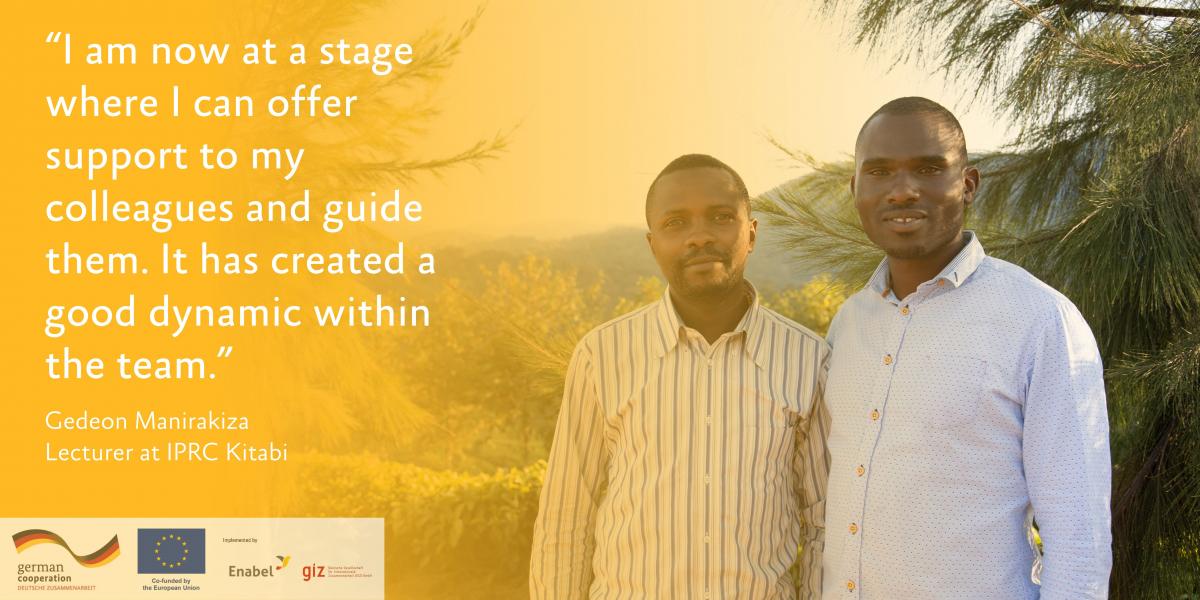
Train the trainers: 4 questions to Gedeon Manirakiza and Fulgence Hagumubuzima, lecturers at IPRC Kitabi (Rwanda)
Philippine DE BRUYN | 20/09/2022
Gedeon Manirakiza and Fulgence Hagumubuzima are lecturers at IPRC Kitabi and have both been following trainings to not only being able to navigate in the new e-learning platform implemented in their school but also to create their own content and guide their colleagues. While Gedeon started some months ago, Fulgence, his colleague just joined the training. How do they collaborate? What do they see as benefits in digitalisation for education? Thanks to their answers, take a closer look into those activities, led by the Resilience to COVID-19 through digitalisation (RESICODI) project, at IPRC Kitabi. Can you shortly present yourself? Gedeon Manirakiza: I am assistant lecturer in forestry department, especially in forestry resources management, at IPRC Kitabi. Fulgence Hagumubuzima: I am a researcher in forestry department, I actually teach various courses including agroforestry, forest plantation for different levels. I joined the school in 2015 as a student and I am now currently working as lecturer. When did you start the trainings? What was your opinion at the beginning? G.M.: A few months ago, Enabel team came to offer us a specific training process on Digital Content Development. It came actually with the aim of supporting us to teach online due to the various circumstances we had to face with the COVID-19 pandemic. It arrived at that a time when it was difficult to stay in touch with our students and we did not really know how to not stop the learning process. I am really thankful for that initiative even if I have to admit that I was not sure digitalisation could help us in this scenario as a lot of students do not have access to a good internet connection.F.H.: I’ve joined the training on digital content development a bit later than my colleague Gedeon. Actually, I heard from him and other colleagues who had been following the training that the online platform was really helpful to stay in touch with students and create more interactions with them. My expectations are therefore quite high because I really want to learn about the value and impact that digitalisation can have on my courses and students. How does digitalisation change your teaching approach? Do you see any benefits or challenges?G.M.: On the one hand thanks to this new approach, I have realised how digital content can make my courses more interactive. It allows us to give (remotely) some tasks to students and they can take some time to make research and produce qualitative work. At the same time it has reduced the distance between me and my class, the interactions between trainer and trainees are more pleasant. On the other hand, I am now at a stage where I can offer support to my colleagues and guide them into the process of using the platform and developing their own content. F.H.: At this point, as I have only been following some days of trainings I cannot say precisely what it is going to change but I have my opinion about it. I suppose, from what I have seen, that this platform and online content will allow me to guarantee a continuity in teaching. During the COVID-19 pandemic, as everybody had to stay home it was not a great period for teaching, interactions were almost impossible and it was really frustrating. I am sure it will allow students to learn quickly and be more reactive when it comes to using digital tools. Then I think that I will see a great opportunity to optimise time management for students and teachers by improving the quality of the content and make sure at each step that students are still following and understanding the course. What are your expectations for the future?G.M.: At this point I am glad that I can create my own digital courses and upload it on the platform. I also know how to add quizzes and various assignments for my students. Nevertheless it will be far more important in the future to be able to monitor the attendance and evolution of my classes.F.H.: I do expert to become an expert in the platform. I have to stay that I am really confident and glad that the program has focused at first on some colleagues as Gedeon. They are now experts and can quickly give support and answer to our questions. I am very motivated to soon be able to develop the same skills as them and then be able to help my colleagues if they are stuck with the platform. I am setting some personal objective to master the platform and hope I will be soon able to present my own courses online.
